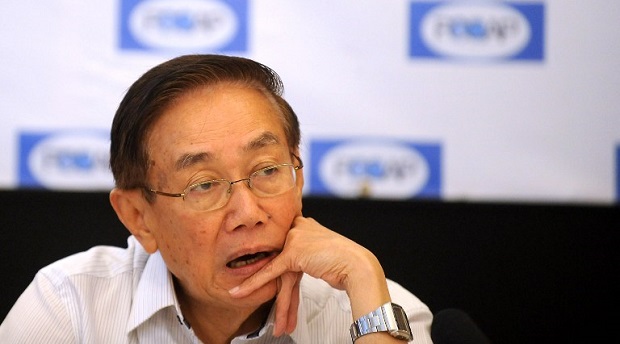LUCENA CITY, Philippines—The dinner-meeting in the Netherlands between House of Representatives officials and exiled communist rebel leaders has improved the atmosphere for the possible resumption of the stalled peace talks, the rebels’ chief peace negotiator said on Sunday.
However, Luis Jalandoni, peace panel chair of the communist-led National Democratic Front of the Philippines (NDFP), said the group’s return to the negotiating table still depended on the release of political prisoners and “peace consultants” languishing in jails across the country on various criminal charges.
“The release of detained NDFP consultants is not merely a procedural issue. Nor is the release of political prisoners,” Jalandoni told the Inquirer in an online interview.
Of the 528 political prisoners, 17 are “peace consultants” whom the NDFP insisted were Joint Agreement on Safety and Immunity Guarantees (Jasig) pass holders.
Notable among them are spouses Benito and Wilma Tiamzon whom the government tagged as top officials of the Communist Party of the Philippines (CPP) and its military wing, the New People’s Army (NPA). The couple were arrested in Cebu in March 2014.
Despite the contentious issue on imprisoned rebels, Jalandoni shared the optimism of Speaker Feliciano “Sonny” Belmonte Jr., calling the three-and-a-half-hour meeting in Amsterdam as “bridge building.”
“The bridge building that occurred in the dialogue between Speaker Belmonte and his colleagues with Joma (Jose Maria Sison), myself and Fidel Agcaoili a few days ago has improved the atmosphere for possible resumption of peace talks between the Aquino government and the NDFP,” Jalandoni said.
Quoting Sison, CPP founder and NDFP chief political consultant, Jalandoni said the rebel peace panel was willing to start negotiating an agreement on social and economic reforms, and seek to finish it before the end of the term of President Aquino in June 2016.
“And with the signing of such agreement [we’ll] see if truce and cooperation are possible,” Jalandoni said.
The NDFP has been engaged in on-and-off negotiations with the government for the past 27 years. The talks have not moved beyond minor agreements.
Sison, Jalandoni, Agcaoili and Ruth de Leon-Zumel, head of the NDFP secretariat met with
Belmonte, House Majority Leader Neptali Gonzales II, Davao Rep. Isidro Ungab and Romblon Rep. Eleandro Jesus Madrona met in a Japanese restaurant in Amsterdam on July 9.
Sison, living in self-exile in the Netherlands since 1987, and other top communist rebel leaders are all based in Utrecht.
Belmonte and other government officials are in the Netherlands to attend the hearings on the government petition in the United Nations arbitral tribunal against China’s incursions in the West Philippine Sea.
Presidential spokesperson Edwin Lacierda described the meeting between rebel leaders and government officials as a “good start” for the possible resumption of peace talks.
Jalandoni said the respect for binding bilateral agreements—Jasig and the Comprehensive Agreement on Respect for Human Rights—as well as the International Humanitarian Law (Carhrihl) could affect the future of peace negotiation.
He emphasized that the respect for Jasig, Carhrihl, The Hague Joint Declaration signed in 1992 and other binding peace agreements “is essential to build trust and prove sincerity in pursuing serious peace negotiations.”
The NDFP chief negotiator said achieving a Comprehensive Agreement on Social and Economic Reforms, and working for truce and cooperation “would be major achievements of both parties.”
But Jalandoni said signing the socioeconomic, constitutional and political reforms should precede the signing of an agreement on ending hostilities and on disposition of forces.
“These agreements have to be done in the above-mentioned order—not otherwise,” Coni Ledesma, wife of Jalandoni and member of the NDFP negotiating panel, said in a speech in April.
Under Jasig, signed in 1995 by the government and communist representatives, consultants and staff of NDFP who are part of the negotiating team are granted immunity from arrest, detention and provide safety guarantees “to create a favorable atmosphere conducive to free discussion and free movement during the peace negotiations, and avert any incident that may jeopardize the peace negotiation.”
But Presidential Adviser on the Peace Process Teresita Deles said the government was not violating Jasig. She cited the NDFP’s failure to follow a July 2011 procedure to verify the true identities of alleged peace consultants on the list.
A list of 75 rebel consultants supposedly with pictures was jointly deposited by the Philippine government, NDFP and Church witnesses in a Dutch vault in 1996 so it could serve as a future basis for identifying guerrilla consultants who could be immune from arrests.
But in 2011, both parties discovered that two diskettes containing the list had been damaged with the passage of time and its details could no longer be retrieved. It made it impossible for the government to verify rebel claims that some of their captured comrades were on the roster of guerrillas with immunity guarantee.
The government’s refusal to release those rebels led to the collapse of peace talks brokered by Norway.
The NPA rebels have been waging a Maoist-inspired war against the government for the past 45 years, considered one of the world’s longest-running communist rebellion.
Their numbers, according to the latest figures from the military have dwindled to about 3,200 armed component and 1,200 noncombatants from more than 26,000 in the late 1980s amid battle setbacks, surrenders and factionalism. But the resilient guerrillas remain the country’s most serious security threat.
The war has claimed more than 40,000 lives, according to government figures.
